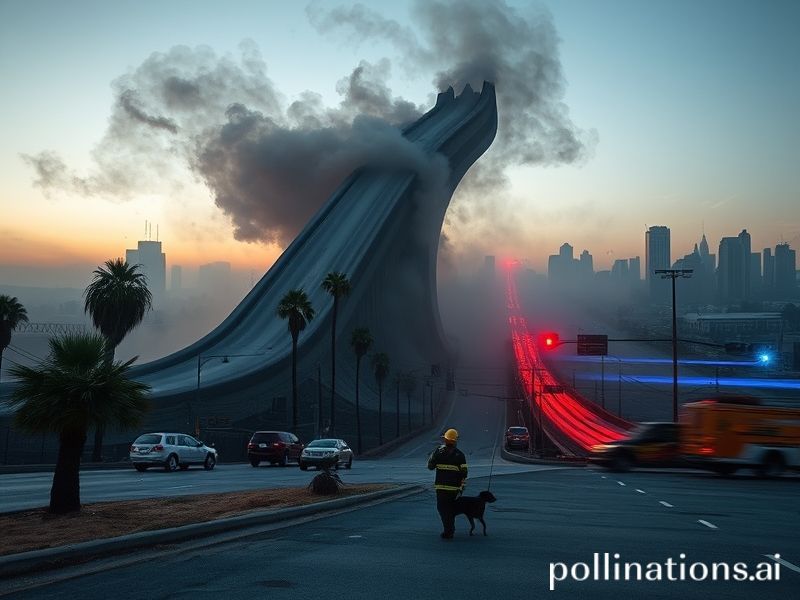Los Angeles Shakes, World Yawns: How a 5.2 Quake Became Global Schadenfreude
LOS ANGELES—The ground beneath Hollywood’s most over-medicated city rolled over in its sleep at 12:20 p.m. local time, registering a polite 5.2 on the Richter scale and reminding the planet that even America’s self-proclaimed capital of reinvention is still, geologically speaking, on the Pacific’s naughty list. From Tokyo to Tehran, seismologists looked up from their coffee, nodded once, and returned to more pressing matters—like the 7.1 that had just rattled Tonga like a bartender with a martini shaker.
When Los Angeles trembles, the world checks its insurance policy. Global markets yawned at the news: the Nikkei dipped 0.3 %, oil futures barely twitched, and Bitcoin—ever the drama queen—fell 4 % because, well, it was Tuesday. Meanwhile, reinsurance giants in Zurich and Munich quietly updated their actuarial spreadsheets and wondered how many more “once-in-a-century” events they can staple into a single decade before the fine print bursts into flames.
The diplomatic fallout was equally muted. Beijing issued a boilerplate statement of “profound concern,” which translated means, “We’re busy building islands that can also shake, thanks.” The European Union dispatched a three-person delegation to “assess trans-Atlantic seismic solidarity,” which is Euro-speak for a long weekend at Shutters on the Beach. Only Mexico City, still nursing memories of 1985 and 2017, offered real empathy and a 30-second earthquake early-warning app that California is still beta-testing because regulatory paperwork moves slower than tectonic plates.
Back on Wilshire Boulevard, Angelenos demonstrated why disaster etiquette is a spectator sport. Instagram influencers live-streamed from beneath doorframes—filter: Valencia, mood: faux-vulnerable—while tech bros in Culver City rushed to ensure their NFTs were still non-fungible. A local news anchor famously advised viewers to “drop, cover, and hold on to your brand partnerships.” Somewhere in the San Fernando Valley, a screenwriter pitched “Fault Line: The Series,” a prestige drama about morally ambiguous geologists guaranteed to win three Golden Globes and zero Emmys.
Yet the quake’s true significance lies beyond cracked stucco and toppled Trader Joe’s salsa jars. It is a reminder that the Anthropocene is not just a buzzword for climate conferences in Glasgow; it’s a planetary IOU coming due everywhere at once. When the same tectonic shrug sends tsunamis toward Chile and knocks bottles off shelves in Los Angeles, the distinction between “developed” and “developing” becomes academic. Concrete is concrete, and gravity is notoriously unimpressed by GDP.
International aid agencies—freshly exhausted from fundraising for earthquakes in Turkey and floods in Libya—viewed the California event with the weary affection one reserves for a rich cousin who stubs a toe. The Red Cross issued a press release urging donations, then quietly diverted resources back to places where clean water is still a rumor. It’s not cruelty; it’s triage dressed up as benevolence.
Still, Los Angeles remains a teaching hospital for global catastrophe chic. Architects from Jakarta study its base-isolated skyscrapers the way med students dissect cadavers. Singaporean civil-defense officials import California’s alert protocols, minus the part where half the population hits snooze. Even the Russians, whose own Far East keeps trying to detach and swim toward Hawaii, monitor CalTech’s seismographs for tips on how to monetize panic.
As aftershocks rumbled like distant bass lines from a Kanye listening party, Mayor Bass reassured residents that the city was “resilient.” Translation: the sushi bars reopened within hours. Because if there is one universal constant, it is humanity’s ability to normalize near-death experiences—then order spicy tuna.
So while the world’s attention drifts back to wars, elections, and the latest celebrity meltdown, Los Angeles keeps balancing on the edge of the Pacific Plate, humming a tune only an optimist or a fool could love. Somewhere, the Earth shrugs again, practicing for an encore no algorithm can predict.







